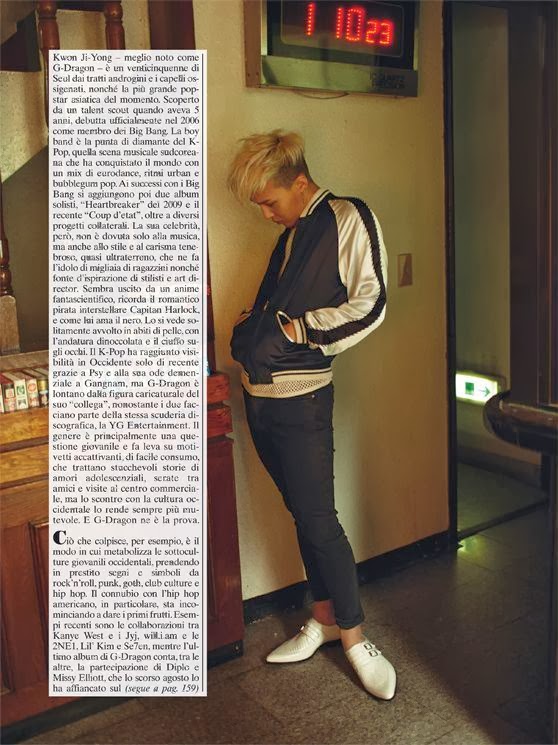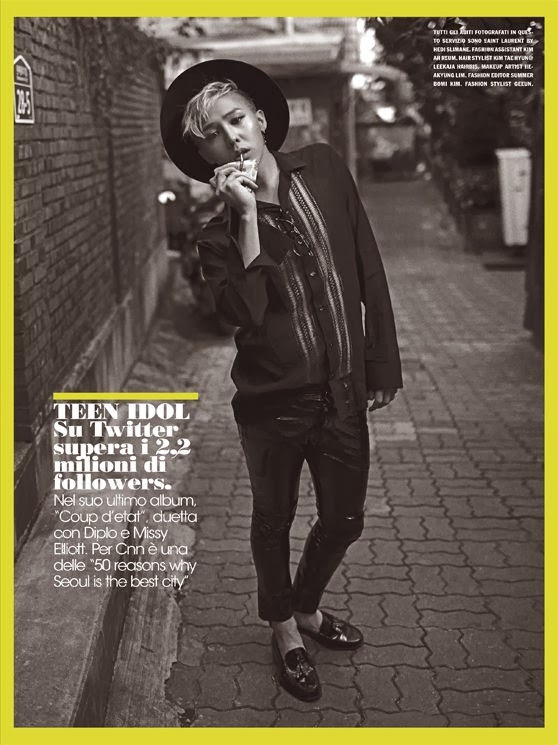G-Dragon looks like he came right out of a sci-fi anime: he resembles the romantic interstellar pirate Captain Harlock and, like him, he loves black. You usually see him dressed in leather and slouching with a lock of hair covering his eyes. K-Pop became famous in the West only recently, thanks to Psy and his crazy Gangnam Style song, but G-Dragon is far from the caricature-like figure of his colleague, even though both artists are with the same record company YG Entertainment.
K-Pop is mainly for a younger crowd with cute, catchy tunes about saccharin-sweet teen love stories and evenings hanging out with friends or going to the mall. And yet, the more it clashes with western culture, the more it changes, and G-Dragon is proof. What is most striking is how K-Pop metabolizes Western youth subcultures and borrows elements and symbols of rock-n-roll, punk, Goth, club culture and hip-hop.
The alliance with American hip-hop, in particular, is starting to give its first results. Recent examples are the collaborations between Kanye West and Jyj, will.i.am and 2NE1, and Lil’ Kim and Se7en, while G-Dragon’s latest album also features the participation of Diplo and Missy Elliott who joined him on the stage of K-Con in Los Angeles, the first K-Pop convention in the States. The occasion was Niliria, a Korean folk song with a rapper twist.
“I was looking for someone who was already an established artist, not a newcomer,” says G-Dragon. “I invited Missy Elliot because I’ve always been a fan of hers and she luckily accepted immediately. She was on a hiatus from work for personal reasons and was a bit concerned about how the public would react seeing her on stage after so much time. The result was phenomenal and it was an honor for me and an amazing learning experience”.
G-Dragon fell in love with hip-hop as a child by listening to Wu-Tang Clan. When he was thirteen, he started writing and singing his first rap songs. Someone at YG Entertainment noticed his talent and immediately had him “study” the subject. With Big Bang, G-Dragon was the rapper of the group. He has a crown tattoo on his forearm resembling the ones that Jean-Michel Basquiat painted on the walls of New York, and someone has even compared him to A$AP Rocky.
G-Dragon’s story is less similar to the Harlem rapper’s than it is to that of Justin (Timberlake or Bieber: take your pick), whose vocal talent and adolescent allure were skillfully cultivated by showbiz agents. Like them, the young Ji-Yong is contrary to the idea of the artist as a product in the hands of the entertainment industry, yet at the same time he realizes how important it is to satisfy the tastes of the public to achieve success. “I had to change a lot of things about me,” he admits, “including the tone of my voice”.
Proof of his versatility is Crooked, another hit from his latest CD. This time the theme has a punk vibe, but from a broader perspective. In the video he provocatively wanders through the alleys of Brick Lane, the famous London hipster spot, accompanied by a gang of rockabillies. He alternates T-shirts featuring the Sex Pistols and Black Flag (which bears the phrase Rich Kids instead of the band’s name) with a dusty blue double-breasted suit and vaguely punk outfits.
Having a carefully groomed image is a priority in a K-Pop show, and fashion and set design play a crucial role. With G-Dragon, these elements find a perfect balance. In fact, the young star recently won the prestigious Style Icon Award, prevailing over several Korean stars and co-nominees, and he was also the star of an exhibit at Cais Gallery in Seoul with brand new photographs, memorabilia, and stage costumes. His image races across the maxi-screens that are all over Asian cities and on thousands of Smartphones around the globe. Fans are bewitched by his surreal aura that makes G-Dragon the perfect pop star for the global society of the post-digital era: he’s so perfect that some may even wonder if he’s real.
Source: L'Uomo Vogue, November 2013











0 comments:
Post a Comment